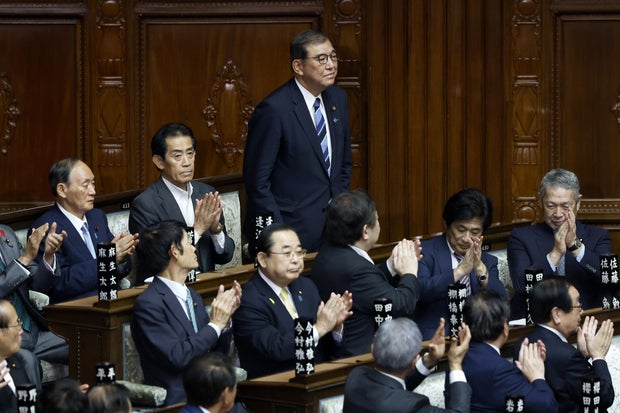Tokyo — Japan’s parliament formally elected Shigeru Ishiba, head of the governing Liberal Democratic Party, as the country’s new prime minister Tuesday.
Ishiba was chosen as the party’s leader Friday to replace Fumio Kishida, who stepped down along with his Cabinet earlier in the day to pave the way.
Kiyoshi Ota / Bloomberg via Getty Images
Ishiba was to announce his new Cabinet later on Tuesday.
Kishida took office in 2021 but is leaving so his party can have a fresh leader after his government was dogged by scandals. Ishiba plans to call a parliamentary election for Oct. 27.
“I believe it is important to have the new administration get the public’s judgment as soon as possible,” Ishiba said Monday in announcing his plan to call a snap election. Opposition parties criticized Ishiba for allowing only a short period of time for his policies to be examined and discussed in parliament before the national election.
Kishida left his office after a brief send-off ceremony in which he was presented with a bouquet of red roses and applauded by his staff and former Cabinet members.
“As we face a critical moment in and outside the country, I earnestly hope key policies that will pioneer Japan’s future will be powerfully pursued by the new Cabinet,” Kishida said in a statement, citing the need to bolster security amid a deepening global divide, such as Russia’s war in Ukraine, while tackling a declining birthrate and population, as well as economic and political reforms at home.
Ishiba earlier announced his party’s leaders ahead of naming his Cabinet.
The majority of his Cabinet ministers are expected, as is Ishiba, to be unaffiliated with factions led and controlled by party heavyweights, and none are from former Prime Minister Shinzo Abe’s powerful group, which has been linked to damaging scandals.
Ishiba’s lack of a stable power base could also mean a fragility of his government and “could quickly collapse” even though Ishiba hopes to build up party unity as it prepares for the upcoming election, the liberal-leaning Asahi newspaper said.
The move is also seen as a step toward revenge by Ishiba, who was largely pushed to the side during most of Abe’s reign.
Ishiba has proposed an Asian version of the NATO military alliance and more discussion among regional partners about the use of the U.S. nuclear deterrence. He also suggested a more equal Japan-U.S. security alliance, including joint management of U.S. bases in Japan and having Japanese Self Defense Force bases in the United States.
Ishiba outlined his views in an article to the Hudson Institute last week. “The absence of a collective self-defense system like NATO in Asia means that wars are likely to break out because there is no obligation for mutual defense. Under these circumstances, the creation of an Asian version of NATO is essential to deter China by its Western allies,” he wrote.
Ishiba proposes combining of existing security and diplomatic groupings, such as the Quad and other bilateral and multilateral frameworks involving the United States, Australia, New Zealand, South Korea and the Philippines.
He also noted that the Asian version of NATO could also consider sharing of the control of U.S. nuclear weapons in the region as a deterrence against growing threats from China, North Korea and Russia.
Ishiba on Friday stressed that Japan needs to reinforce its security, noting recent violations of Japanese airspace by Russian and Chinese warplanes and repeated missile launches by North Korea.
He pledged to continue Kishida’s economic policy aimed at pulling Japan out of deflation and achieving real salary increases while tackling challenges such as Japan’s declining birthrate and population and resilience to natural disasters.
The LDP has had a nearly unbroken tenure governing Japan since World War II. Party members may have seen Ishiba’s more centrist views as crucial in pushing back challenges by the liberal-leaning opposition and winning voter support as the party reels from scandals that drove down Kishida’s popularity.
Ishiba, first elected to parliament in 1986, has served as defense minister, agriculture minister and in other key Cabinet posts, and was LDP secretary general under Abe.







